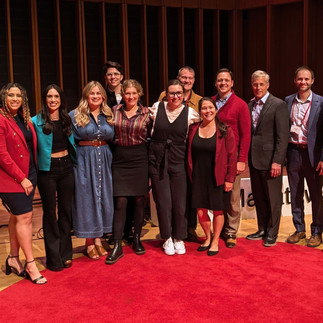1+1: Challenge networks change everything + Fun facts about TEDx
- Josh Wymore

- Oct 16, 2024
- 4 min read
Hey there! Here’s one leadership idea and one resource I’ve found beneficial this week:
1 idea: Challenge networks change everything
On October 8th, I delivered my first-ever TEDx talk. After breathing a huge sigh of relief, taking some fun photos, and celebrating at the after party, I had a three-hour drive home to reflect on what I wanted to share with you from the whole experience.
I considered walking you through the wild emotional journey: the excitement and nervousness of preparing, the stress of a dress rehearsal where little goes according to plan, and the strange mixture of satisfaction and self-doubt when you finish. I thought about taking you inside the green room with the other speakers or exploring the surprising dynamics of the event itself (occasionally magical but mostly mundane). But the takeaway that rose above them all was: challenge networks change everything.
In Think Again, Adam Grant points out that while many of us have support networks, most of us lack challenge networks. These are people who disagree with you in good faith--who challenge you to think again because they care about you. I love this idea because leveraging a challenge network hits all four pillars of humbler leadership:
Accurate Self-Perception: Asking for feedback is an acknowledgement of your limitations--and listening to diverse perspectives makes your self-perception more accurate.
Appreciating Others: By looking for insight rather than affirmation, leaders show that they value the wisdom others have to offer.
Growth Mindset: Focusing on improving yourself over proving yourself is the embodiment of growth mindset.
Greater Purpose: Few of us enjoy being criticized, but leaders subject themselves to it for the greater purpose of getting better and making a difference.
As soon as I learned I was selected for this TEDx talk, I felt challenged to practice what I've preached by leaning into my challenge network. So I reached out to a number of the most thoughtful, honest communicators I knew and asked for help. That was six weeks before I stepped on stage.
Since then, more than a dozen people took time to listen to drafts of my talk and share feedback with me. Some did it more than once. One (Emily!) offered thoughts almost daily. At every step, someone provided a new perspective that helped make the talk better—often in significant ways.
It’s hard to objectively measure just how much impact someone has had on you, but I tried. The morning after the event, I wondered: how much did my talk actually change from when I started? I felt like the answer was “a lot,” but I was curious to know just how much. So because I’m a recovering nerd, I decided to run the numbers. It turned out that from the first draft to the 17th (the one I delivered), only 9% of the content was the same. My final product bore little resemblance to my first prototype.
It's so easy for me to look at a speaker delivering a powerful, passionate message and place them on a pedestal. But the truth is that the best speakers in the world have whole teams—entire villages—pouring into their word choices, visuals, and delivery so that they can be effective messengers in that moment. None of us is an island. Anything of value is built by many hands.
So I want to take this moment to say thank you to my challenge network--the leaders who gave their valuable time to offer thoughtful feedback to me: Joe Niemiec, Jasmin Niemiec, Whitney Bandemer, Kevin Butler, Nathan Heintzeman, Derek Jacobsen, Sally Stitzer, Tony Opliger, Geoff King, Amos Norman, Arlan Friesen, Donovan Coley, Maria Lehr, Emily Wymore, & Patrick Clark.
Thank you to my support network as well--the numerous friends and family members who supported me through prayer, texts of encouragement, or even driving multiple hours to see the event live. Thank you in particular to Jan Yost and Kathleen Sloan for helping out with my kids so my wife could attend in person.
And thank you above all to my wife, editor-in-chief, and loveliest challenger, Emily Wymore. She listened to me process this talk for six weeks straight and never once rolled her eyes. Thank you, Emily, for offering me sage advice every step of the way.
Without these networks, this process would have been much lonelier, and the result would have been much worse. I am indebted to you all.
***
Who qualifies for your challenge network?
What are the important decisions you are processing or projects you are tackling?
How could a challenge network help make them better?
1 resource: Fun facts about TEDx
I've been asked a lot of questions about TEDx over the last few weeks. Here are some answers to FAQs you might find fascinating:
TED stands for Technology, Entertainment, & Design. Those themes were the original focus when the organization debuted in 1984. At their first conference, they demoed two breakthrough innovations: the CD and ebook.
While there is only one TED event every year ("big TED"), there are a couple thousand TEDx events around the world annually. Each one is licensed by TED, organized locally by volunteers, and must adhere to the same TED standards for speakers.
Speakers have a maximum of 18 minutes to share their idea.
Preparation includes multiple meetings with a speaking coach and a full dress rehearsal.
Speakers must stay inside "the red dot." Size varies, but this one was 12 feet in diameter.
Talks are posted to the official TEDx YouTube channel a month or so after the event.
If you purchase a book via the link above, I may receive a small commission (at zero cost to you).















Comments